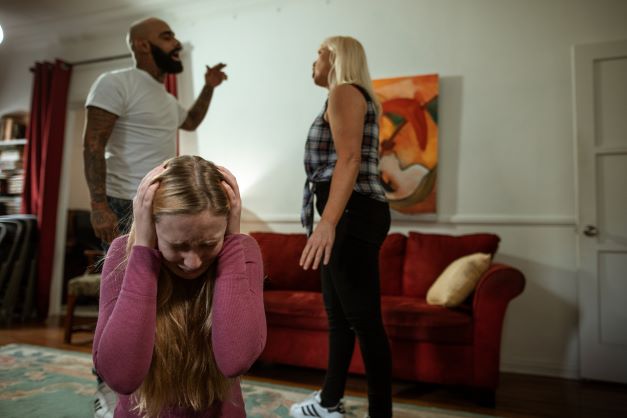|
Do you find yourself easily breaking down even from the slightest mishap? Sometimes, this can be rooted in one’s childhood experiences and the pain these brought.
They say childhood is easily the happiest time in anyone’s life. Children experience life in a vastly different way than how adults do. They look at the world through the lens of innocence which has yet to see life’s bitterness and troubles. They go about their days worry-free and without the burden of responsibility, allowing them to live life easily. They’re taken care of and given the freedom to explore and interact with the world in whatever way they want. This is how children are supposed to be reared. However, not every child has the luxury and privilege to experience this. In reality, some children live a somewhat problematic and traumatic life earlier. What is Childhood Trauma? Any emotionally painful event that can cause long-term physical and mental distress is considered childhood trauma. This encompasses physical, sexual, and emotional abuse, neglect, and witnessing violence or parental divorce. While it can be difficult to believe that children experience such cruel events, it is prevalent and can be easily dismissed by either parents or authorities. According to the NCTSN or the National Child Traumatic Stress Network, around 78% of adults reported remembering traumatic experiences before the age of five. And this only reflects the percentage of those who explicitly remember. There can be instances when people repress negative experiences as a coping mechanism. Thus, this 78% is only a rough estimate and can increase in number. Childhood trauma isn’t only a thing from one’s past. It will continue to haunt their memories and influence their behavior. Therefore, as adults, it’s crucial that people learn to be introspective, acknowledge their feelings, and deal with their past demons. Trauma Manifesting in Adults Traumatic events are often easily overlooked, not because people see them as trivial occurrences, but because they can easily pass as harmless behavior. When unresolved, this trauma can be carried until adulthood and manifest in different behavioral patterns. There’s no surefire indication of childhood trauma, but its most common impact revolves around the person’s self-image. Adults may cultivate the belief that they aren’t enough. With their experience in childhood neglect and abandonment, they may focus on their weaknesses and distort their perceptions of self, associating it with failure. This heightened criticism can likewise impact how people interact with each other, allowing them to disregard boundaries and accept toxicity. Physical Manifestations. Besides its mental and psychological scars, childhood trauma may have physical manifestations such as chronic illnesses and physical disturbances. Trauma can also be associated with unusual stress levels, influencing one’s hormonal behavior. This weakens the body, preventing it from performing at its full capacity. Hence, not only does childhood trauma affect one’s capabilities, but it may also impact others’ perceptions of the person. Emotional Manifestations. Over time, trauma can alter one’s understanding of their own emotions. This causes people to react differently or overreact in certain situations unnecessarily. These distressing events can also increase one’s aggressiveness, anxiety, and emotional outbursts and can be a primary reason for depression and panic attacks. Childhood trauma may have happened in the past, but its impact can drag on in the future. This can range from individual manifestations such as the ones mentioned above to a more social impact. While these demonstrations aren’t exactly destructive, they still hinder one’s development. Working with Childhood Trauma These manifestations aren’t a perpetual consequence. Adults can address the trauma driving these behaviors and move forward to change. Acknowledge that it Happened A simple instance of opening up to others whom one wholeheartedly trusts can be the first step to processing trauma. Admitting something one has experienced can be very difficult as an adult since this can likewise mean acknowledging or associating that event with one’s weakness. However, it’s essential to understand that trauma is never the victim’s fault. Work with a Professional When working through trauma and other distressing psychological circumstances, the best resolution should be with a professional. People can find these painful memories too much to handle. Thus, professionals can guide how to best work through them. Additionally, these professionals can provide materials and other methods to control pain and become stronger individuals. Find a Support Group One can easily find a professional that can help them. But whether they accept the help and follow the advice depends on the individual. Interacting with individuals who share the same trauma can be enough motivation to fuel one’s drive to betterment. Lean on others’ experiences and learn how they worked through their problems. A perfect material to learn from is Veronica’s overcoming journey from childhood abuse, The Other Side of Fear. In this book, she shares how she worked through the issues she experienced as a child and how these impacted her life.
0 Comments
Childhood trauma has a connection to how people interact with people, affecting how they manage their relationships.
Childhood trauma is one of the principal reasons for psychological, mental, and physical issues. This trauma is caused by any distressing event that happened to a person during their earlier years, which results in more distressing behavioral patterns in adulthood. And one of these patterns is in line with how they form and navigate around their adult relationships. More people have had traumatic childhoods than you’d think. In fact, in the United States alone, it’s been found that more than two-thirds of children are reported to have encountered some form of trauma. While this is a shared experience, it doesn’t mean it should remain unresolved. Hence, if you’re having trouble forming deeper relationships with others, you might want to be introspective and look back on your possibly rough past. Childhood Trauma on Relationships Prolonged exposure to adverse and traumatic experiences can affect how people perceive themselves and the world. Additionally, these childhood experiences may haunt the victim, reinforcing the belief that such events may happen to them at any time. This may end up preventing them from genuinely connecting to someone emotionally. Reciprocation to Affection One factor that’s significantly affected by childhood trauma is the person’s ability to reciprocate someone’s emotions. Most children develop trauma due to neglect and abandonment from their parents, the primary people they would have expected to receive love and protection from. This pain may influence their capabilities to trust and positively react to anyone’s affections. Besides, if their parents hurt them, why would they have to believe that others won’t? Childhood trauma can teach children, now adults, not to trust anyone due to their previous experiences. Thus, they may prefer to stay away from forming relationships than risk letting someone in and possibly getting hurt in the future. Avoidant Attachment Style Childhood is when people receive and learn the very essence of security. They have their parents guiding them on how to be reliable and secure. With this aspect absent from their memories, people with traumatic childhood navigate relationships unknowing how to provide affection to the people they like correctly. They end up treading water around relationships due to their lack of experience with intimacy and security. Rather than letting someone get to know them, they may end up putting a wall around them. Anxious Attachment Style Contrary to the previous point, childhood trauma can also bring out a person’s fear of abandonment. Rather than keeping themselves away from people, they may experience the opposite. The nagging feeling that their partner can leave them anytime may lead to their readiness to do anything to make them stay, even if this means setting aside their interests. This attachment style, however martyr or heroic it may appear, can lead to a toxic relationship. Communication Style Children with troubled pasts may model what routine they lived with. For instance, if their parents constantly yelled and were aggressive with each other throughout their childhood, they may reflect this in their relationships. And with modeling, people repeatedly exposed to it will find it hard to change the behavior and have trouble realizing fault with it. This leads to two things. They might experience trouble expressing and relaying their emotions appropriately or develop toxic tendencies and hurt others. Lastly, regarding childhood trauma affecting relationships, this doesn’t only include the romantic or platonic ones. It can also negatively influence one’s relationship with their religious beliefs. Spirituality Severed by Trauma In most instances, trauma can sever people’s belief and connection to God or any divine figure they believe in. This is due to the thought that if these figures were real, they wouldn’t have allowed such an event to happen to them. This likewise leads to a grudge against their belief, forcing them to stray away from their spirituality. This influence leads one to develop a grudge against and stray away from their spiritual belief. It can also impede their journey in healing from the trauma since one’s religion and beliefs are essential to work through it. For a better reference, you can learn more about the significance of the ultimate love of God in Lisare’s book. With her narrative, you will follow and understand how childhood trauma does impact one’s life and how religious belief can help in facing this trauma. When people fall into a bottomless pit of anxiety and fear, it can be challenging to find a way back. But the right mindset and using the right behaviors, people can easily find peace in the chaos.
The world has fallen into a relatively perpetual state of fear and anxiety. With the seemingly never-ending risk of the pandemic, escalated warring between multiple nations, and the heightened climate crisis, people are subtly yet constantly surrounded by chaos. And as this happens, the individual’s condition suffers the most. When people are exposed to anything the brain deems unusual or dangerous, its initial response is to feel scared or anxious. Fear is one of the core reactions humans have. It’s an emotion fundamental to their experiences and deeply etched into their history. As an evolved reaction, fear has helped them avoid situations that can bring harm and discomfort. While fear is an instinct naturally built into everyone, it can also be as damaging. Prolonged exposure to fear and anxiety can overwhelm one’s immune system and cause physical and physiological issues. Here are some ways to stay calm amidst the chaos to avoid that. Recognizing the Value of Chaos For a person to move against it, they must first acknowledge its presence and recognize how it contributes to their life. Though nobody wants chaos in their lives, it has a valuable purpose. For one, it can act as a signal for repositioning. When life starts to feel disorderly, as though nothing is ever going right, it can propel one to introspect and question whether they are serving their life’s true purpose. This can make them reroute and try a different path in life. Secondly, chaos makes life more rewarding. Without it, people won’t recognize what peace and order are. Likewise, it exists to make one appreciate peace and proactively search for it. While life with a sense of chaos may seem dark, one without it can also be dull, repetitive, and can quickly lose meaning. Trusting Oneself One of the reasons why people dislike chaos is linked with their dislike of uncertainties. Without order, the mind is at constant haywire – adjusting to new environments, analyzing what’s safe and what isn’t. Chaos equals danger; to a standard equation, nobody survives danger unscathed. This is where trust in one’s capabilities comes in. People must believe in themselves and their capabilities to fare against unpredictability. They need to recognize their strengths so that they can Have Faith in a Higher-Order When one experiences too much pain and disorder, it can be easy to believe that the world and anything that governs it has abandoned them. However, this mindset can be changed. Instead, one can assume that since they’re experiencing it, the universe must believe they can handle it. With the correct belief and faith in the guidance of a higher being, they will endure anything that comes their way. Trust that God’s perfect love and the other side of fear will help one emerge from this hardship. This is how author Wendy Veronica Lisare overcame her life’s obstacles. When her problems piled up and she doubted her ability to retake control of her life, she leaned into her spirituality and drew strength from her faith. Chaos Results in Growth People instinctively avoid chaos because it’s the opposite of what they want in life: ease, comfort, and pleasure. However, they often fail to see how chaos precedes these things. It helps them achieve these. Chaos is the means to attain ease, comfort, and pleasure, which are the endgames. In avoiding chaos, people have likewise unconsciously avoided opportunities that could have resulted in their personal growth. And obviously, this isn’t the right way through life. Amid a hurdle in life, be kind to yourself and let yourself through the experience calmly and patiently. Be with (the Right) People It’s been scientifically proven that one of the best ways to stay calm in frightening situations is the presence of another person. Being with the right crowd gives one a proper support system to get people through trying times. Additionally, knowing that they aren’t alone in the experience can lessen any psychological tension through the event. This can also provide the best result if the supporting crowd has better means of processing or has learned to stay calm throughout the experience. The right person’s company can offer an individual a calming effect. Fear is the brain’s natural response to anything unusual. However, this doesn’t mean that people must continue living in a constant state of fright. Living by these steps when facing aversive situations can only make the emotion a healthy occurrence for an individual. |



 RSS Feed
RSS Feed
